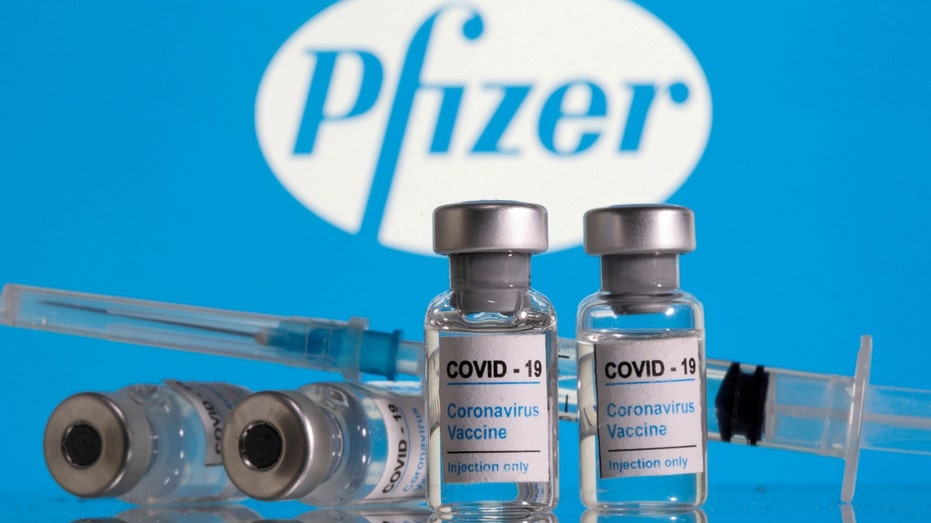Lower omicron efficacy delayed FDA review on Pfizer shot in kids under 5
Regulators and drugmaker opted to finish testing before weighing vaccine’s performance in that age group after early signs of weakness against the variant
Lab study finds Pfizer COVID pill effective against omicron
Fox News contributor Dr. Janette Nesheiwat discusses Pfizer’s new anti-viral COVID-19 pill and the importance of early treatment.
U.S. health regulators delayed their review of Pfizer Inc.'s Covid-19 vaccine in children under 5 years old because the initial two-dose series so far wasn't working well against the Omicron variant during testing, people familiar with the decision said.
An early look at data showed the vaccine to be effective against the Delta variant during testing while that was the dominant strain, but some vaccinated children developed Covid-19 after Omicron emerged, the people said.
So few study subjects, whether vaccinated or unvaccinated, developed Covid-19 during testing thus far that the small number of Omicron cases made the vaccine appear less effective in an early statistical analysis, the people said.
LOWER OMICRON EFFICACY DELAYED FDA REVIEW ON PFIZER SHOT IN KIDS UNDER 5
As more cases emerge, Pfizer's shot might wind up providing stronger protection against Omicron, the people said, if the bulk of infections are in unvaccinated subjects.
Officials from the Food and Drug Administration and Pfizer agreed it would be better to wait for the additional cases, the people said. The extra time would let the agency assess the vaccine's effectiveness as either two doses or three, they said. The FDA was going to make its decision by looking at whether the shot generated immune responses comparable with those seen in older people.

Vials labelled "COVID-19 Coronavirus Vaccine" and a syringe are seen in front of the Pfizer logo in this illustration taken February 9, 2021. (Reuters/Dado Ruvic / Reuters)
The delay will also allow regulators to see how a third dose performs, the people said. That additional dose is given at least two months after the second shot. The FDA hopes to have a decision on the vaccine this spring, the people said; Pfizer has said it expects study results in early April.
Yet researchers are counting on more cases just as the Omicron wave declines in many countries. That could make it difficult to get enough Covid-19 cases to determine efficacy quickly, potentially forcing researchers to rely on immune responses.
ASTRAZENECA SEES $4B IN COVID-19 VACCINE SALES
The decision to wait, which came days before the FDA was expected to issue its determination, angered some parents who were eager to vaccinate their young children and confused others unsure of what to do. It also prompted some health experts to criticize the FDA, saying it should have waited all along to avoid authorizing a medicine that didn't generate a strong enough immune response.
The FDA had urged Pfizer to apply for authorization in children ages 6 months to 5 years old, though the company had been planning to wait for testing to finish.
| Ticker | Security | Last | Change | Change % |
|---|---|---|---|---|
| PFE | PFIZER INC. | 27.02 | -0.19 | -0.69% |
The vaccine, from Pfizer and partner BioNTech SE, is in wide use among people 5 years and older. Younger children are the only group waiting for FDA clearance, and Pfizer has been testing a lower dose of its vaccine in that cohort.
The testing was taking two forms: For a faster assessment, the companies explored whether the shot produced the same level of immune response in the younger children as it did in older people. They were also looking to see how many young study subjects developed Covid-19, then analyzing the numbers of vaccinated and unvaccinated people who develop cases to determine the shot's efficacy.
GET FOX BUSINESS ON THE GO BY CLICKING HERE
In a preliminary look at the data, researchers saw the vaccine was about 50% effective in the children when Delta was the predominant strain circulating, despite mixed results in whether the vaccine generated the desired immune response, the people said.
In children ages 6 months to 2 years, the shot generated an immune response comparable to that seen in young adults, but it didn't do so in children ages 2 to 4 years, according to the companies. Independent vaccine experts say they don't know why the vaccine performed poorly in some children, and the companies have declined to speculate.
One factor, the experts say, could be that children have less developed immune systems. The relatively small number of Covid-19 cases that have emerged in study subjects could also potentially skew results.
READ MORE ON FOX BUSINESS BY CLICKING HERE
Some health experts point to the low dosage given to the young children as another possible factor. Pfizer and BioNTech are testing a 3-microgram dose in children under 5 years, one-tenth the dose given to older children and adults. Using a higher dose risked more adverse effects such as sore arms and fever, one of the people familiar with the vaccine's development said.
Pfizer had studied a higher dose of 10 micrograms in a small group of children in an early study last year, but the drugmaker said it found too many of the subjects experienced side effects such as fevers and chills.
Testing has found the 3-microgram doses have a good safety profile, Pfizer has said. The companies have said they hadn't observed any serious safety concerns during the testing.
The continuing study is evaluating a third dose at the same 3-microgram dose. The extra shot has produced a strong immune response in testing, one of the people said.




















